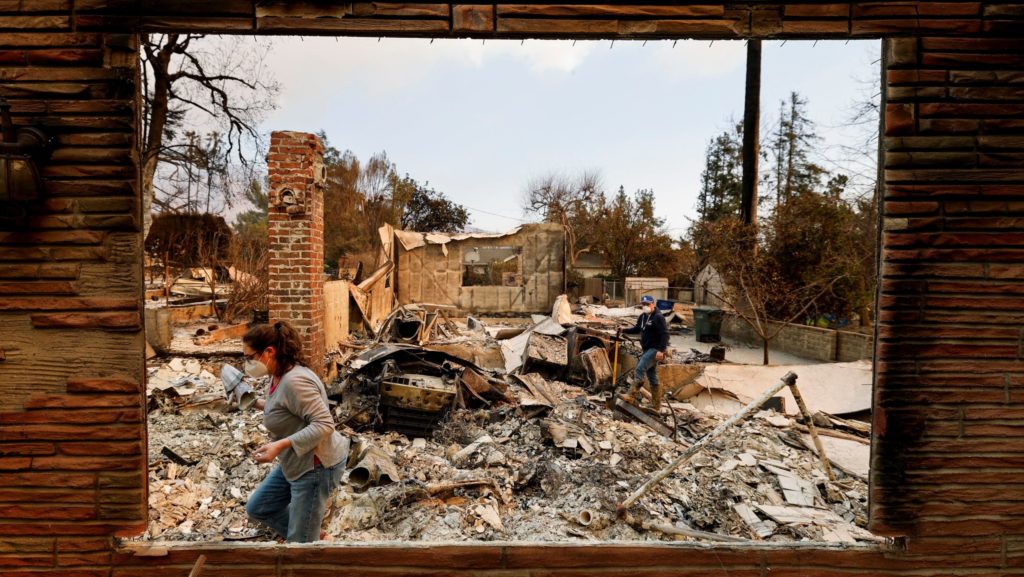“We lost everything in the fire.”
Marie, a woman who was volunteering next to me at the Pasadena Elks Lodge to help victims of the Eaton Fire, pulled out her phone and showed me the charred remains of what was once her beautiful home.
Her loss, sadness, and shock were real. But even more shocking to me was that Marie was facing her loss by paying it forward to her neighbors and community members who were in the same boat.
Another volunteer, Denise, was helping fold clothing to distribute to families who had lost everything in the fire. “I would much rather be here helping others than thinking about what has happened in my neighborhood,” Denise told me.
Teary-eyed and sad, she went on to tell me about her history of volunteering in the Altadena community, from assisting in classrooms to supporting sports teams.
While those places she supported may be gone, the community spirit that created the idyllic neighborhood is not.
No one would have thought less of Marie or Denise if they decided to cope with the tragedy in another way. When the unthinkable happens, it’s natural to consider one’s needs first. Who would blame victims if they are not thinking about others in their acute suffering?
Yet after interviewing hundreds of fellow nonprofit founders over the past decade for a book on this topic, I have learned that many people intuitively know the path to their own healing begins by helping others. The people I’ve spoken to all suffered a loss to a great or lesser degree, but they took their pain and gave it a purpose.
According to the U.S. Census Bureau and Americorps, more than 75.7 million or 28.3% of the U.S. population aged 16 and older formally volunteered in 2023. That is more than one out of four Americans.
In total, their service added up to 5 billion hours of formal volunteering, an average of 66 hours per person. In addition, more than half of Americans 16 and older say that they provided informal help to their neighbors.
As a lifelong Pasadena resident, I have seen this community come together time and time again to help one another in times of loss.
When I lost my own mother in a car accident two decades ago, our community rallied around our family in ways we could never begin to repay. Neighbors paid my parents’ bills while my father was in a coma. We received six weeks worth of meals while we attended three funerals that resulted from the accident. Friends mailed our Christmas cards and bought diapers for our young children. The list goes on.
This is what this community knows what to do in the face of tragedy. Like the beautiful San Gabriel Mountains which were formed over centuries of earthquakes, this community will rise from the rubble as it continues to give and learn to receive. Learning to receive is a real act of the will. We have to acknowledge our vulnerability, dependence, and need. We have to open ourselves up to another aspect of being human — asking for help.
It was through receiving so much help that I learned how giving has the power to heal.
A year after our family’s tragedy, I started a nonprofit with a group of friends to provide chaplains from a variety of faiths to Children’s Hospital Los Angeles. We created emergency baptismal kits, organized candlelit vigils for the children we’d lost, and started the tradition of “tea for the Soul” for staff.
It was serving that community which healed my own loss and grief in unforeseen ways. Seeing another person’s pain up close helps you to better understand your own. It is through serving others we gain empathy and perspective that puts us on the long path to healing.
I asked my friend Stephanie if I could start a GoFundMe for her family after they lost everything in the Altadena fire. Stephanie asked whether in lieu of that offer, I would consider starting a fundraiser for the Los Angeles Regional Food Bank, of which she is a board member. I immediately replied, “But you don’t own a toothbrush!”
In the end, we did both. Stephanie recognized that her friends needed an outlet for their own healing by supporting her family, whom they loved. For Stephanie, supporting her beloved LA Regional Food Bank is a way for her to begin her own healing process.
“Things don’t always end up how you hope or plan that they will,” she told me. “But we are discovering the most amazing support from our community and everyone around us. I am reminded daily of the love that surrounds me during one of the most difficult times in my life.”
Altadena will dig out of the rubble. In the process, we will be healed together — as the statistics and our stories reveal, it’s the only way we will.

